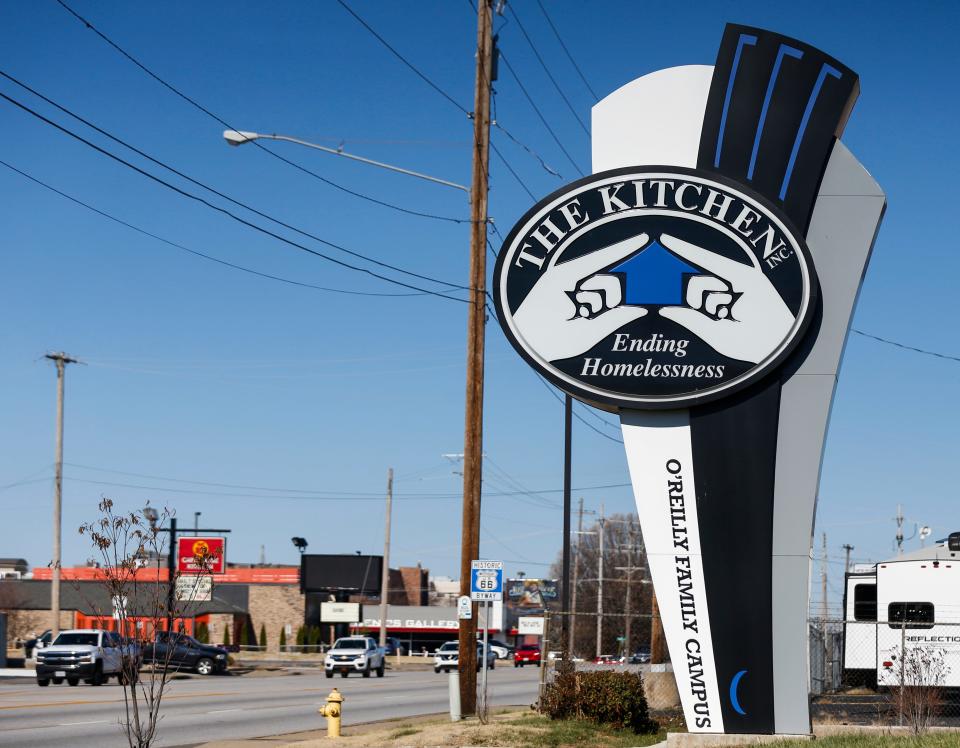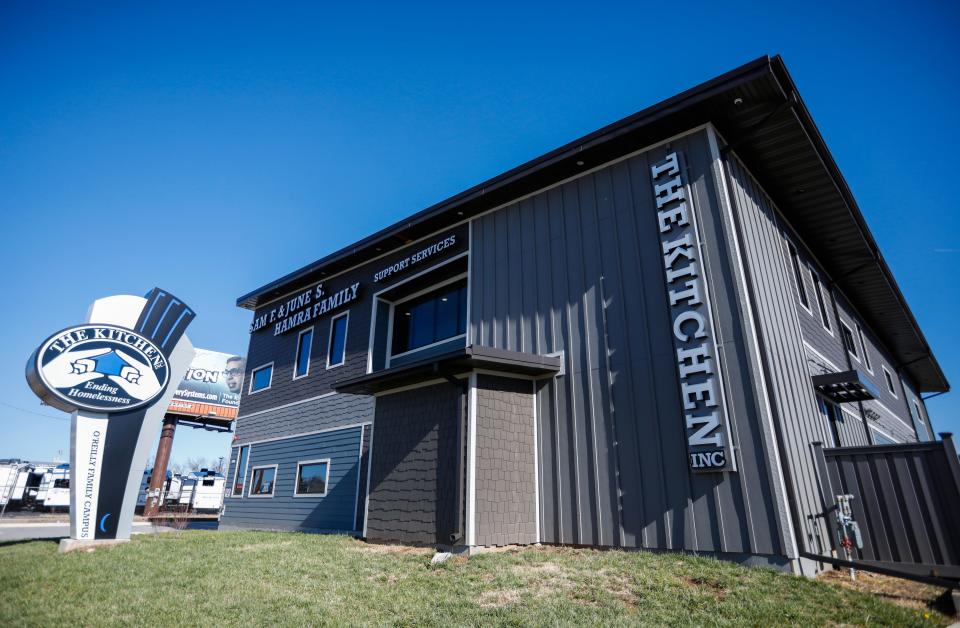The Kitchen, Inc. says employee retention a priority in wake of ex-staff complaints

Employee compensation and a disconnect between management and frontline workers at The Kitchen, Inc. were among the complaints highlighted in a letter former staff sent to the nonprofit's board of trustees before Thanksgiving.
The emailed letter, which was virtually signed by two dozen former employees of the homeless services organization, outlined additional concerns about the nonprofit's finances, management and treatment of employees.
An initial response from The Kitchen's board president defended the nonprofit's work, noting it recently received reaccreditation and has broken ground on an affordable housing development, Maplewood Villas, that will include spaces set aside for homeless veterans.
In more recent correspondence, Kitchen CEO Meleah Spencer — whose salary was among the complaints called out in the letter — pushed back on some of the letter's claims about pay and turnover.
The letter sent by the ex-employees references a total of 33 employees who either quit or were fired over a two-year period, which it says represents "an abysmal turnover rate of 82%, which we feel to be the direct result of poor management."
According to Spencer, a review of The Kitchen's records showed the turnover rate among employees was 65% in 2021 and 29% in 2020.
"Historically, nonprofits suffer with high turnover rates," Spencer said in a statement to the News-Leader. "The COVID-19 pandemic exacerbated employee turnover throughout many employment industries."
She also noted that, earlier in 2022, "The Kitchen, Inc. underwent strategic planning with staff and board of trustees in which a key strategic priority will focus on employee development and retention."
More:As temperatures drop, Springfield cold weather shelters lack gathering spot, volunteers

What the former employees said about The Kitchen, Inc.
The former employees' email to the board, which was sent to the News-Leader and a number of other news outlets at the same time, didn't mince words.
The email, sent by former case manager Patrick Haenni, accuses the nearly 40-year-old organization of losing its way.
"[A]t times, these organizations can forget their original purpose and focus more on the activities of gaining more and larger donations or constructing more and more buildings, rather than serving the at-risk population that needs their assistance," the letter says. "They become parasites on society, taking money meant for the homeless and using it to increase the monetary value of the NGO through property holdings, or to pay their management's bloated salaries. In cases such as these, there is no real incentive to actually solve the homelessness problem."
The letter cites divisions between management and other employees, a focus on fundraising and constructing new buildings rather than providing services that keep people out of homelessness long-term, and employees being "treated as expendable."
Referencing reporting in the News-Leader about a staff exodus at The Kitchen's Rare Breed facility in 2018, the letter said "[s]ince then there has been a continuous turnover of employees from The Kitchen due to the toxic work environment within the organization."
Previously:New lawsuit filed by advocates against Missouri law restricting homeless camping
The Kitchen, Inc. says wages in line with other nonprofits
Low wages were also highlighted. According to Haenni, the majority of former employees who signed the letter were case managers, who along with other frontline staff such as donation center workers and shelter night monitors are paid hourly.
Case managers who worked in community housing made about $14.43 per hour and case managers who worked in Supportive Services for Veteran Families made about $16 per hour, Haenni said in a follow-up email to the News-Leader.
These rates have since changed for case managers, Spencer, The Kitchen's CEO, said in a later email to the News-Leader. She did not specify starting rates but did say case managers who worked in Supportive Services for Veteran Families do get paid a $1 hourly increase due to "many complexities and rigorous requirements the case manager must fulfill to maintain grant compliance."
He said that, in addition to case managers, other former employees who signed the letter held positions that included housing coordinators, director of accounting, community development coordinator, shelter director and behavioral health nurse. The average length of employment for those who signed the letter was under two years, Haenni said.
Spencer, The Kitchen's CEO, said in an interview that hourly pay for case managers "varies" but is in line with peer organizations.
"We have done comparable testing to other homeless agencies and we are right in the mix where everyone else starts out at," she said.
The Kitchen officials say budget includes restrictions
The Kitchen, Inc. officials also noted that much of the funding the organization receives is restricted for specific purposes.
The nonprofit, founded in 1983 by Sister Lorraine Biebel, has opened four affordable housing developments, an emergency shelter and Rare Breed Youth Services, which provides resources to homeless youth ages 13-24. The Kitchen also operates Home at Last, a program funded through the Supportive Services for Veteran Families.
Funding comes from multiple entities, including individual donors. On a federal level, grants typically come through the U.S. Department of Housing and Urban Development (HUD) and the U.S. Department of Veterans Affairs.
HUD offers funding for Rapid-Rehousing and Permanent Supportive Housing. Rapid-Rehousing aims to connect people experiencing homelessness with permanent housing and Permanent Supportive Housing provides long-term leasing or rental assistance for households with at least one disabled member.
The VA offers funding for the Supportive Services for Veteran Families program, which provides case management and resources to prevent a veteran from losing a home or rehouses veterans and their families who are experiencing homelessness.

The Kitchen received $532,723 through HUD and $746,531 through the VA in 2021, Spencer said. The majority of payroll for Supportive Services for Veterans Families case managers is paid through the VA grant.
Funding received through programs like Rapid Re-Housing, Permanent Supportive Housing and Supportive Services for Veteran Families must be used for appropriate programming. Otherwise, the organization may have to relinquish the funding.
"Money can only be spent on these specific items," said Theresa Oglesby, The Kitchen, Inc.'s director of programs and compliance. "There's a huge part of compliance. It's a balance between making sure we are providing quality services and interactions with our participants, but also on the other side, making sure that all of our documentation is correct and adequate."
In addition to these federal sources, The Kitchen also receives funding from the Missouri Housing and Development Commission, which helps run the organization's on-site shelter, located on Glenstone Avenue. The organization applies for other regional, state and federal grants.
More:Consultants on how Springfield can fight homelessness: Basic needs, affordable housing, less stigma
Former employees say board's response disappointing so far
The Kitchen's initial response, sent by board president Ellen Hammock, said the organization could not "comment on any previous employee relationships, including those that have not been part of the team for several months or years."
It did not specifically address the former employees' allegations about leadership and priorities, but noted that management was reviewed as part of the nonprofit's reaccreditation by the Council on Accreditation in April, which included interviews with staff, the board and clients, as well as a tour of the facility.
"(The Kitchen, Inc.) received no out of compliance ratings in any fundamental practice standards," the statement said. "The review focused on CEO and management performance, financial stability, human resources policies and procedures, programming, and board governance."
In a follow-up email to the News-Leader, the group of ex-staffers said the board's statement "was obviously disappointing but not unexpected."
"Their response was just smoke and mirrors to deflect from the issues brought up in the letter. We were hopeful the Board would appreciate how rare it is to have 20+ previous employees who felt so strongly about improving an organization that they would come together to send a letter of concern."
Along with Haenni, the former employees who signed the letter include: David Meyer, Kathy Cobb, Michelle Brown, Mary Tower, Maryann Heaps, Stacey Harshberger, Stefanie Nentrup, Colin Ayre, Casey Crump, Maria Graham, Jesse Packwood, Kendall McDaniel, Brooke McDaniel, Elisa Coonrod, Dallas Brede, John Gauthier, Amy Pederson, Devon Wade, Darrin Yount, Vicki Johanson, Shelley Smith, Austin Green and Courtney Myers.
This article originally appeared on Springfield News-Leader: The Kitchen, Inc. responds to complaints lodged by former employees

